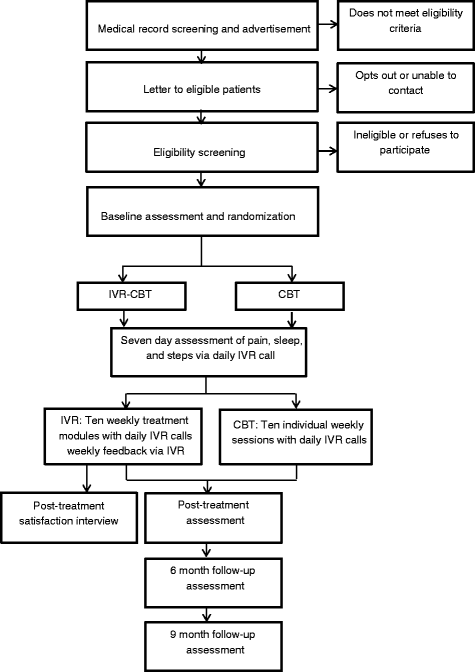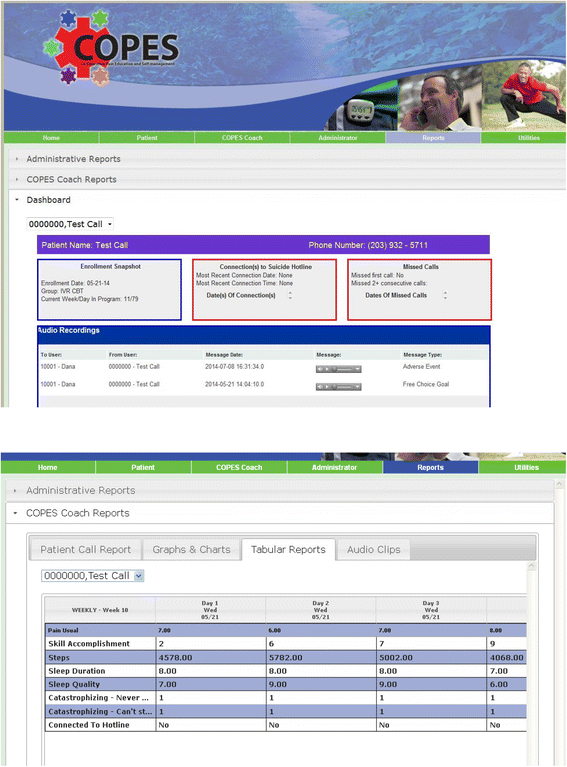Cooperative pain education and self-management (COPES): study design and protocol of a randomized non-inferiority trial of an interactive voice response-based self-management intervention for chronic low back pain
- PMID: 26879051
- PMCID: PMC4754867
- DOI: 10.1186/s12891-016-0924-z
Cooperative pain education and self-management (COPES): study design and protocol of a randomized non-inferiority trial of an interactive voice response-based self-management intervention for chronic low back pain
Abstract
Background: The Institute of Medicine report "Relieving Pain in America" recommends the promotion of patient self-management of pain for all people with pain. Given the high prevalence of chronic pain in the US, new strategies are needed to enhance access to cognitive behavioral therapy (CBT) and other evidence-based treatments designed to facilitate self-management of chronic pain conditions. Although CBT is efficacious, many patients have limited or no access to CBT. Technology-assisted delivery of CBT may improve access while maintaining efficacy.
Methods/design: We describe a randomized non-inferiority trial of interactive voice response (IVR)-based CBT for patients with chronic low back pain. This intervention uses daily IVR monitoring and weekly pre-recorded therapist feedback, based on patient-reported information, to provide treatment for patients at home. A total of 230 patients with chronic low back pain are being identified from a single statewide health system serving US military veterans. Participants are randomized to receive either ten weeks of in-person CBT or IVR-based CBT. The primary outcome is pain intensity as measured by the Numeric Rating Scale immediately post-treatment. Secondary outcomes include pain-related interference, emotional functioning, and quality of life measured immediately post treatment, and 6 and 9 months post recruitment. Exploratory objectives of the study are to examine: (1) potential mediators of impact on clinical outcomes (treatment retention, self-reported skill practice ratings, IVR call adherence, and treatment satisfaction); and (2) moderators of treatment engagement, adherence to therapist recommendations for pain coping skill practice, and effects on clinical outcomes.
Discussion: This non-inferiority trial may identify an alternative to resource intensive in-person CBT that allows many more patients to receive care while also increasing retention of those enrolled in the program.
Trial registration: ClinicalTrials.gov: NCT01025752 . Registered 3 December 2009.
Figures
References
-
- Institute of Medicine (U.S.), Institute of Medicine (U.S.), Committee on Advancing Pain Research Care and Education, Institute of Medicine (U.S.), Board on Health Sciences Policy, and ebrary Inc . Relieving pain in America a blueprint for transforming prevention, care, education, and research. Washington, D.C.: National Academies Press; 2011. - PubMed
-
- Ostelo RW, van Tulder MW, Vlaeyen JW, Linton SJ, Morley SJ and Assendelft WJ. Behavioural treatment for chronic low-back pain. Cochrane Database Syst Rev 2005:CD002014. - PubMed
Publication types
MeSH terms
Associated data
Grants and funding
LinkOut - more resources
Full Text Sources
Other Literature Sources
Medical
Miscellaneous



